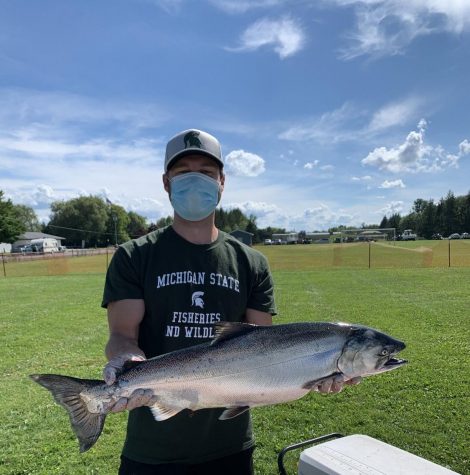The Sci-Files – 02/07/2021 – Jake Sawecki – A Gutsy Approach to Management of Great Lakes Salmon
February 8, 2021

On this week’s The Sci-Files, your hosts Chelsie and Danny interview Jake Sawecki. Jake is a second-year Ph.D. student in the Department of Fisheries and Wildlife and is a member of the Predator Ecology and Astacology lab. Jake joined the lab last year and has adopted the primary research role on the Huron-Michigan Predator Diet Study that began in 2017. His research focuses on the dietary behaviors of salmon and trout species within lakes Huron and Michigan. Over the last several decades the Great Lakes’ food webs have undergone several changes. The introduction of invasive species, such as the round goby, zebra mussels, alewife, and rainbow smelt (to name a few), have altered the ecosystem significantly. Competition between native prey fish and these new invasive fish have drastically changed the food web and forced fisheries scientists to make difficult decisions about the management of the Great Lakes. One of the most successful invasive fish species, the alewife, exploded in population size in the Great Lakes several decades ago. As a result, pacific salmon were introduced to consume these prey fish as a method of biological control and created a multibillion-dollar sport fishery in doing so. However, prey fish availability in the lakes has continued to change throughout the years and directly impact the feeding behavior of top predators within these lakes. Understanding the diet of these top predators is vital to the sustainability of the sport fishery. Put simply, if there isn’t enough food for the top predators, they will starve and there will be no more fish to catch. Jake’s research focuses on identifying and quantifying the diet of the major predator fish within lakes Huron and Michigan (rainbow trout, salmon, lake trout, walleye). This information will help inform the folks involved in managing these fish populations about how many of a particular species the lakes may be able to support based on prey availability so that we can avoid putting more fish in the lakes than there is food to support them. Since 2017, with the help of several collaborators (MI DNR, United States Fisheries and Wildlife Service, United States Geological Survey, etc) and volunteer anglers, the project team has processed over 12,000 fish stomachs. With one more year of stomach collections on the calendar, Jake expects the total number of fish stomachs processed to reach nearly 20,000.
If you’re interested in talking about your MSU research on the radio or nominating a student, please email Chelsie and Danny at scifiles@impact89fm.org. Check The Sci-Files out on Twitter, Facebook, Instagram, LinkedIn and YouTube!































